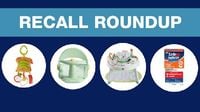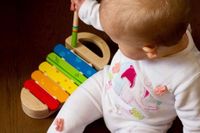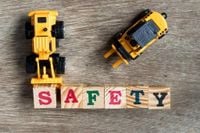In a significant move to protect children, the European Union has announced plans to ban toxic "forever chemicals" from children's toys sold both online and in physical stores. This decision, effective as of April 14, 2025, aims to address growing concerns about the safety of toys and their potential long-term health impacts on young consumers.
The term "forever chemicals" refers to a group of synthetic substances known as per- and polyfluoroalkyl substances (PFAS), which are notorious for their durability and resistance to degradation. These chemicals have been linked to various health issues, including developmental problems in children, immune system dysfunction, and increased risks of certain cancers. The EU's decision underscores a growing recognition of the need for stringent regulations regarding children's products.
As part of its initiative, the EU plans to implement strict testing and compliance measures for all toys entering the market. This includes rigorous assessments to ensure that toys do not contain harmful levels of PFAS or other hazardous substances. The move has been welcomed by health advocates and environmental groups, who have long campaigned for safer consumer products.
"It is essential that we protect our children from the harmful effects of these chemicals," said a spokesperson from the European Commission. "By banning PFAS in toys, we are taking a crucial step towards ensuring a safer environment for our youngest citizens. We cannot afford to compromise their health for the sake of convenience or cost."
In addition to the EU's actions, several popular products in the United States have also been recalled due to safety concerns. Notably, Fisher-Price has announced the recall of approximately 253,000 of its Brunch and Go stroller toys due to a choking hazard. Reports indicate that the egg yolk component of the toy can crack, posing a risk of swallowing for young children. Fisher-Price has received five reports of incidents, including two where infants attempted to put pieces of the yolk in their mouths. Thankfully, no injuries have been reported.
These toys were sold at major retailers, including Kohl's, Macy's, and Walmart, from February 2022 to March 2025. The Consumer Product Safety Commission (CPSC) advises parents to keep these toys away from children and to contact Fisher-Price for a free replacement. Users are instructed to label the toy with the word "Recall" and dispose of it properly after receiving confirmation from the company.
Fisher-Price is also recalling around 15,300 of its Tissue Box toys, which were sold with three-in-one SnugaPuppy Activity Centers. The detachable tissue box has been reported to come apart, exposing small parts that can be a choking hazard. Again, no injuries have been reported, but the CPSC is urging users to remove the toy from the activity center and to contact Fisher-Price for a replacement.
In another recall, Bebamour is recalling about 1,350 baby bath seats due to a drowning hazard. The CPSC has indicated that the seats may tip over during use, and the leg openings are too wide, increasing the risk of slipping out. These bath seats were sold from May 2024 to February 2025 on Amazon and Bebamour's website. While no injuries have been reported, parents are advised to stop using the product and contact Bebamour for a refund.
Additionally, Kramer Laboratories is recalling roughly 14,250 units of its Safetussin Max Strength Multi-Symptom cough, cold, and flu blister packs due to packaging that fails to comply with the Poison Prevention Packaging Act. The packaging is not child-resistant and contains acetaminophen, posing a poisoning risk to young children. The medicine was sold at various grocery stores and pharmacies from July 2024 to March 2025. Users are advised to keep the product out of reach of children and to contact Kramer Laboratories for a refund.
As these recalls highlight, the safety of children's products remains a critical concern. The rise of online marketplaces has made it easier for unsafe toys to enter the market, prompting local authorities like Milton Keynes City Council's Trading Standards team to raise awareness about the dangers of non-compliant toys. Their research indicates that 85% of toys purchased from third-party sellers on major online platforms do not meet UK safety standards, which poses significant risks to children.
Milton Keynes City Council's Trading Standards has launched its Toy Safety Matters initiative to educate parents and caregivers about the importance of purchasing safe toys. They recommend buying from trusted retailers, checking for proper safety markings, and inspecting toys for any loose or broken parts before use. "Toy safety should never be taken for granted," a representative stated. "With the support of the British Toy and Hobby Association, we’ve been helping local families better understand the risks of unsafe toys so they can make informed decisions, especially when shopping online."
In conclusion, the EU's decision to ban toxic chemicals in toys, alongside ongoing recalls in the U.S., reflects a broader commitment to safeguarding children's health. As parents and caregivers navigate the complexities of toy safety, awareness and vigilance remain paramount in ensuring that children can play safely.






